Spring 2014 Semester
Videos for Spring ’14–check back for updates!
Wednesday, February 19th, 3:30pm, Kiva Auditorium
Kory Stamper, from Merriam-Webster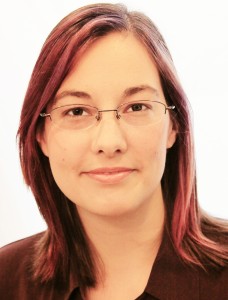
Title: Harmless Drudgery: The History and Making of English Dictionaries
Audio recording (podcast) with no video
Audio recording with video of powerpoint slides
Abstract: We tend to think of dictionaries as static, distant references, but this is not the case: they are constantly curated, compiled, and revised by lexicographers. Further, dictionary creation in and of itself is not a static process,but has changed dramatically over the last few centuries. We will begin with a short history of English dictionaries, focusing primarily on American-English dictionaries and their role in the prescriptivist/descriptivist debates of the last two centuries. Once grounded in the historical development of the dictionary, we will discuss the creation of a dictionary: the considerations that go into shaping each dictionary, the process of vetting words for entry, and the way that technology has changed lexicography and dictionaries (both for the better and the worse).
Bio: Kory L. Stamper joined Merriam-Webster as an editor and lexicographer in 1998 and has defined and edited entries for a number of dictionaries and thesauri, including Merriam-Webster’s Collegiate Dictionary, Merriam-Webster’s Advanced Learner’s English Dictionary, and the new Merriam-Webster Unabridged Dictionary. In addition to defining, she writes on etymology and usage for the Merriam-Webster blog “A Thing About Words” at Merriam-WebsterUnabridged.com, as well as for the popular video series Ask the Editor at Merriam-Webster.com. Her own blog on language and lexicography, harmlessdrudgery.com, has been reviewed favorably in the New York Times Magazine, The Paris Review, and The Millions. As a lexicographer and language specialist, she travels to regional and national TESOL conferences and presents on the history of the English language, the process of making dictionaries for different audiences, and the vagaries of teaching idiom, tone, and register to non-native English learners. Kory earned her B.A. in Medieval Studies from Smith College with a focus on Indo-European languages and literature, and is an active member of the AmericanDialect Society and the Dictionary Society of North America.
Monday, February 24th, 4:00pm, 422 Anderson Hall
Dr. Christina Sanz, Georgetown University, hosted by the Department of Spanish & Portuguese
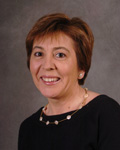 Title: Many Shades of Gray: Beyond Black and White on the ‘Teaching Grammar’ Controversy
Title: Many Shades of Gray: Beyond Black and White on the ‘Teaching Grammar’ Controversy
Bio: Cristina Sanz (PhD 1994) is Professor of Spanish & Linguistics at Georgetown University where she directs the Intensive & School of Foreign Service Spanish Programs, the Barcelona Summer Program, and the Catalan Lectureship. Sanz received her Licenciatura in Peninsular Literature from the Universitat de Barcelona. She has taught several languages in high schools and colleges, and continues to educate future language teachers in the US and abroad. An expert on multilingualism, her edited volume Mind and Context in Adult SLA received the 2006 MLA’s Mildenberger Award. Dr. Sanz has published in such scholarly venues as the Journal of Cognitive Neuroscience, Language Learning, Applied Psycholinguistics, Modern Language Journal, and Language Learning and Technology. She has been a consultant to private and public institutions such as the United Nations and the Instituto Cervantes.
Tuesday, March 11th, & Wednesday, March 12th, 2014, 3:30pm, Walk Auditorium
 Manne Bylund (Stockholm University) & Panos Athanasopoulos (University of Reading)
Manne Bylund (Stockholm University) & Panos Athanasopoulos (University of Reading)
Title: Spatio-temporal Metaphors, Time Perception, and Bilingualism
Abstract: Time is a fundamental dimension of human existence. In our everyday lives, we constantly engage in thinking and communicatingthe order in which events take place, and how those events extended in time. Human language offers a rich set of tools to talk about time, but also exhibits considerable crosslinguistic variation. To convey temporal duration, many languages rely on spatial concepts of distance and quantity. In English, temporal duration is typically conveyed through distance metaphors (i.e., long time), whereas in Greek and Spanish, duration is commonly expressed through quantity metaphors (i.e. poli ora/mucho tiempo, ‘much time’). Previous research has shown that when estimating duration, speakers of Greek, Spanish, and English are influenced by different spatial cues, such that speakers of English tend to conflate distance (as represented by line displacements) with temporal duration. Spanish and Greek speakers, conversely, tend to conflate quantity (as represented by filling containers) with time (Casasanto, 2005, 2008). This phenomenon is labelled language-specific spatial interference. We extended this paradigm to Swedish, a language with distance-based spatio-temporal metaphors (lång tid, ‘long time’), and examined under what conditions such interference occurs. The results confirmed previous findings, showing that Swedish speakers were more influenced by distance than quantity when estimating duration. By manipulating the experimental setup, we also found that language-specific interference is strongest when the stimuli are preceded by linguistic prompts. Furthermore, we investigated language-specific spatial interference in bilingual speakers with L1 Spanish and L2 Swedish. Here, the results suggested that the degree to which language-specific interference occurs depends on factors such as age of L2 acquisition and language proficiency. These findings are discussed in relation to previous research on cognitive restructuring among bilingual speakers in other perceptual domains.
Bio: Dr. Manne Bylund is Associate Professor at the Centre for Research on Bilingualism at Stockholm University. His research concerns cognition and conceptual representation in bi- and multilingual speakers, particularly in the domain of motion events. He also specialises in maturational constraints in language development, with particular focus on the development of L1 and L2 proficiency in L2 speakers with varying bilingual backgrounds. His work has appeared in journals such as Applied Linguistics, Bilingualism: Language and Cognition, Cognitive Science, Language Learning, Linguistics, and Studies in Second Language Acquisition.
Panos Athanasopoulos (University of Reading) & Manne Bylund (Stockholm University)
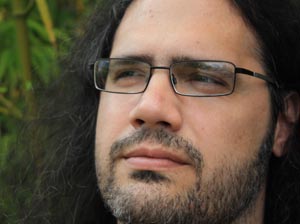
Title: Representation of Motion Concepts in Bilingual Cognition
Abstract: The linguistic relativity hypothesis suggests that the way humans construct mental categories depends on the labels made available by native language. If so, which language do bilinguals rely on as a source of conceptual organization? Recent research shows that speakers of languages that lack grammatical aspect (e.g. German) tend to pay more attention to endpoints of motion events, whereas speakers of aspect languages (e.g. English) tend to pay more attention to the ongoing action of a motion event. Here, we study conceptual organization in German-English early and late bilinguals by manipulating contextual variation and verbal interference in two motion categorical perception tasks asking participants to judge the similarity between clips based on the degree of endpoint salience. In the first experiment, a contextual variation effect was found exclusively in late bilinguals, such that those tested in an all-German context behaved more like German monolinguals, whereas those tested in an all-English context behaved more like English monolinguals. Early bilinguals displayed intermediate behaviour in relation to their monolingual peers regardless of testing context. When we disrupted verbally mediated categorization by asking bilinguals to repeat strings of numbers in their first and second languages, early bilinguals showed no changes in categorization behaviour across conditions. Remarkably, late bilinguals displayed categorization behaviour that was opposite to that of the language of interference. Hence, categorization is jointly mediated by first and second language in early bilinguals, but functionally distinct according to language context and processing demands in late bilinguals.
Bio: Dr. Panos Athanasopoulos is Associate Professor in the School of Psychology and Clinical Language Sciences at the University of Reading. He is a psycholinguist specializing in bilingual cognition and conceptual representation. He applies an experimental approach to language and thought, using behavioral measures such as verbal elicitation, nonverbal similarity judgments, free-sorting, and visual search, as well as neurophysiological measures such as Event-Related Brain Potentials. His recent research programs have examined the influence of grammatical categories like number, gender, and aspect on object classification and event perception, as well as the influence of language on perceptual categories such as color and facial expression of emotion. His work has appeared in a range of psycholinguistics and wide readership journals such as Applied Psycholinguistics, Bilingualism: Language and Cognition, Language and Cognitive Processes, Cognition, Cognitive Science, and Proceedings of the National Academy of Sciences of the USA.
Wednesday, April 9th, 5:30pm, Walk Auditorium
Dr. Betsy Rymes, University of Pennsylvania
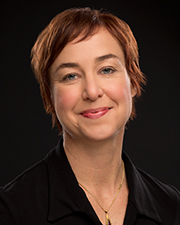
Title: Citizen Sociolinguists: Who are they and Why Should We Care What they Say?
Abstract: Citizen Science is the study of our world by the people who live in it. Professional scientists have drawn on citizen scientists to help understand natural phenomena from butterfly and bird migrations to folding proteins and DNA Strands. Analogously Citizen Sociolinguistics is the study of the world of language by the people who use it. In this presentation, I will illustrate a methodology for engaging in Citizen Sociolinguistics, drawing on the Internet and daily news (internet circulated, usually) to find “Citizen Sociolinguists” who speak with authority and a wealth of sociolinguistic knowledge. We will be rethinking methods of sociolinguistics by looking at how people create Internet perspectives about language and communication (YouTube videos like the “South Philly Accent Challenge” or “How to talk like a Philadelphian”). While these internet-circulated sources provide only snapshots of language and social life, I will illustrate how they are highly significant, emblematic snapshots–the ones we should be paying attention to. Finally, I will point to ways teachers and students can collaborate in citizen sociolinguistic study of their own, using the citizen scientific methods I have begun to illustrate, to gather and analyze data and develop critical awareness of language and communication patterns around them.
Bio: Dr. Betsy Rymes is Associate Professor of Educational Linguistics at the University of Pennsylvania’s Graduate School of Education. Her research, theoretically and methodologically informed by linguistic anthropology, is centered in educational contexts and examines how languages, social interaction, and institutions influence what students get out of schools. She has published in Language in Society, Journal of Linguistic Anthropology, Research on the Teaching of English, TESOL Quarterly, Anthropology & Education, Linguistics & Education, and Harvard Educational Review, among others, and is the author of the books Conversational borderlands (Teachers College Press, 2001), and Classroom discourse analysis: A tool for critical reflection (Hampton, 2009) and co-editor, with Stanton Wortham, of Linguistic Anthropology of Education (Praeger, 2003). Her current research investigates students’ communicative repertoires and their function in massively multilingual schools and her most recent book is Communicating beyond language: Everyday engagements with diversity (Routledge, 2014).
Wednesday, April 16th, 2014, 3:30pm, Tuttleman Learning Center, lecture hall 103
Dr. Gabrys-Barker, University of Silesia (Poland)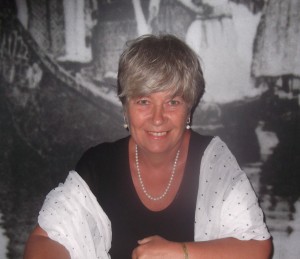
Title: The affective dimension of teaching: Critical incidents and appraisal systems in focus
Abstract: In the development of teacher training programmes reflecting modern ideas in education, which stress autonomy and reflectivity, the concepts of teacher presence and classroom awareness have become basic to our understanding of what teaching and the teacher’s role are, both in the classroom and beyond it. Teachers´ perceptions of their own classroom experiences and the way they are reflected upon and interpreted constitute a significant factor in the evolution and re-structuring of teachers´ initial beliefs about teaching and learning. This presentation introduces the concept of the critical incident (Tripp, 1993) as a tool in the development of pre-service and in-service teachers´ reflectivity, contributing to their classroom presence and classroom awareness in the context of foreign language teaching. The ability to diagnose critical incidents is seen as an inseparable part of a teacher´s ability to control the teaching context and so bring about critical events (Woods, 1993). This presentation also discusses the concept of an appraisal system (Smith & Lazarus, 1993, Scherer 2001), understood as one´s evaluation of the relationship between one´s success and failure in respect of past experience and the ability to adapt to an immediate context. In my analysis I follow Scherer´s (2001) taxonomy of appraisal system components comprising novelty, the pleasantness of a task and coping potential, among others. This appraisal system is seen as emotionally-driven but it also emphasizes the cognitive dimension and the interaction between affective and cognitive processing. The empirical part of the presentation reports on a study on critical incidents (CI) in teaching EFL. The main objective of the study was to make in-service teachers of EFL reflect upon their most memorable CI and evaluate it from the affective viewpoint. The study was also to make the subjects more aware of themselves and their classroom presence. The research instrument used in the project was the Geneva Appraisal Questionnaire – GAQ (Scherer 2001).
Bio: Danuta Gabrys-Barker is Professor of Applied Linguistics at the University of Silesia, Katowice, Poland, where she teaches courses in applied linguistics and second language acquisition. Her main areas of research interests are multilingualism and reflexivity and affectivity in second language teaching and learning. She has published numerous articles and three books: Aspects of Multilingual Storage, Processing, and Retrieval (2005), Reflectivity in Pre-Service Teacher Education (2012) and The Affective Dimension in Second Language Acquisition (co-edited with Joanna Bielska, 2013). Together with Eva Vetter, she is co-editor of the International Journal of Multilingualism.
References
The Geneva Appraisal Questionnaire (GAP) at “http://www.unige.ch/fapse/emotion/resmaterial/resmaterial.html”>http://www.unige.ch/fapse/emotion/resmaterial/resmaterial.html, accessed on 27th Oct 2011
Scherer, K. R. 2001. ”Appraisal considered as a process of multi-level sequential checking”.
In K. R. Scherer, A. Schorr, & T. Johnstone (Eds.), Appraisal processes in emotion: Theory, methods, research, 92-120. New York and Oxford: Oxford University Press.
Smith, C.A. & Lazarus, R.S. 1993. “Appraisal components, core relational themes, and emotions”. In Cognition and Emotion, 7, 233-269.
Tripp, D. 1993: Critical incidents in teaching. Developing professional judgement. London:Routledge.
Woods, P., 1993: Critical events in teaching and learning, London: The Falmer Press.
Wednesday, April 23rd, 3:30pm, Walk Auditorium
Rescheduled from Feb. 5th due to weather
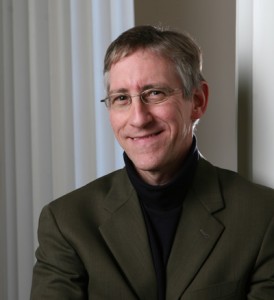 Dr. Robert Schrauf, Pennsylvania State University
Dr. Robert Schrauf, Pennsylvania State University
Title: A Language-Based Approach to Mixed Methods Research
Abstract: Two of the themes that dominate the literature on mixed methods research are: 1) ontological and/or epistemological assumptions about the nature of the phenomena under observation (e.g. the post-positivist stance of quantitative research vs. the interpretivist stance of qualitative research), and, 2) the logic of the integration of the results (e.g. triangulation, complementarity, expansion, etc). In this talk, I take a language-based view of mixed methods research by framing both methods of data collection as essentially conversational and discursive productions, which helps resolve the post-positivist vs. interpretivist debate. Then I argue that the discursive genres specific to each (e.g. statements, opinions, propositions in the survey; co-constructed narrative performances in the interview) bring into focus different aspects of the phenomenon under investigation, which addresses how data from bothmethods can be integrated. I illustrate this approach with cross-cultural data on beliefs about Alzheimer’s disease among African American, Mexican, and refugees/immigrants from the Former Soviet Union in the United States.
Bio: Robert Schrauf is Professor and Head of the Department of Applied Linguistics at Penn State University. He conducts research in cross-cultural gerontology, narrative gerontology, Alzheimer’s disease, experimental and longitudinal approaches to multilingualism, and bilingual autobiographical memory. He is a Fellow of the Gerontological Society of America and on the editorial boards of the Journal of Cross-Cultural Gerontology and Cross-Cultural Research.
Thursday, April 24th, 2014, 5:30-7:00pm, Tuttleman Learning Center, lecture hall 103
Abel Rodriguez, Nationalities Service Center & Defender Association of Philadelphia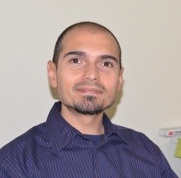
Title: Legal Challenges Facing Our Immigrant Communities
Abstract: As comprehensive reform is repeatedly stalled, our immigrant communities continue to face harsh immigration enforcement and millions of people remain without a path to lawful status in the United States. Dauntingly complex laws and recent immigration policy have led to a record number of yearly deportations, widespread family separation, and fear of any contact with law enforcement officials. The current state of immigration law and pervasive anti-immigrant sentiment result in particular challenges for immigrants pursuing education, seeking employment, and working to establish their lives in this country.
This presentation is intended to provide educators with an understanding of the legal issues facing immigrant learners. This talk will present an overview of the limited possibilities available to obtain lawful status in the United States. It will address the false dichotomies of “legal/undocumented” as well as “good/bad” immigrants, describing the spectrum of immigration statuses that exist and the continuously expanding categories of those prohibited from seeking status in this country. The presentation will also include a discussion of the practical challenges faced by those attempting to navigate the immigration system, particularly those lacking English proficiency.
Bio: Abel Rodriguez holds a split position as a Staff Attorney at Nationalities Service Center and Immigration Specialist at the Defender Association of Philadelphia. In this capacity, he advises clients of the immigration consequences of their criminal proceedings, represents the formerly convicted in deportation proceedings, and co-teaches Temple Law School’s Immigration Clinic. Abel is a graduate of Cabrini College, Stanford University, Harvard University, and Penn Law School. Prior to practicing law, he was a Lecturer in Foreign Language and Course Chair at the University of Pennsylvania.
Monday, April 28th, 2014, 5:30-6:30pm, Barton Hall 402
-and-
Thursday, May 8th, 2014, 10:30-11:30 Ritter Hall 106
Mr. Michael Wesley, Investigator, & Ms. Andrea DelMonte, Attorney
US Department of Education, Office of Civil Rights
Title: Understanding the Legal Provisions of Equal Education Opportunities for All Children and Youth
Abstract: Have you wondered about the responsibilities of schools in providing equal education opportunities to ALL students? How are violation complaints filed to the Office of Civil Rights? And, what happens once they are? Find out how the office for civil rights enforces Title VI in public institutions to ensure that their programs serve all students effectively. Illustrative cases will include locally investigated discrimination complaints for ELLs.
Bios: Born in Easton, PA, Michael earned his Bachelor’s degree in Secondary Education (Social Studies concentration) with honors from Kutztown University, in 1992. He joined the Office for Civil Rights (OCR) in 1994, after serving for two years as a long-term substitute teacher for several school districts in the Lehigh Valley area. He is a senior level Equal Opportunity Specialist for the Philadelphia OCR office. He has investigated both complaints and compliance reviews, concerning a variety of educational equity issues – including the provision of services to English language learners. Michael was the facilitator for the office’s Teacher Preparation proactive initiative. He coached a 4th-8th grade girls CYO Track and Field team for four years, and was an assistant coach for a community flag football team for one year. His interests include running, traveling, cartooning, and home brewing. Michael considers the birth – and ongoing raising – of his twin boys (now 10) as his most significant achievement.
Andrea L. DelMonte is an attorney with the Office for Civil Rights. She has been with OCR for 3 years. During that time, Andrea has worked on a large-scale compliance review concerning a school district’s ELL program and several complaints related to schools’ ELL programs. Prior to joining OCR, Andrea worked for a mid-size firm in New Jersey, representing mainly boards of education, and also as a judicial law clerk in the Superior Court of New Jersey. Andrea earned her law and undergraduate degrees from the University of Richmond. Her interests include tennis, cooking, and yoga.
Fall 2013 Semester
Tuesday, November 5, 2013, 3:30pm, Ritter Annex 301
Dr. Gary Ockey, Educational Testing Service
Title: Using the group oral discussion test to measure the ability to orallycommunicate in a second language
Abstract: The ability to orally communicate requires many abilities that are often not measured by second language oral assessments. The group oral discussion task has been shown to measure aspects of this ability that other tasks do not assess. In the group oral discussion, a small group of test takers, typically three or four, are expected to sustain a conversation or discussion on an assigned topic for a given length of time. After the test has begun, the test moderator does not contribute to or direct the conversation in any way. The format has received an increasing amount of attention over the past decade, and is now used in various contexts, including high and low stakes situations. Its increased popularity is most likely due to its potential for eliciting oral ability components that other oral assessments do not, particularly aspects of interactional competence, including turn taking, negotiating meaning, and responding to others.
A growing number of studies and reports suggest that the group oral discussion test does have potential to be an effective test of oral communication. Research findings have also raised questions about the validity of the format, however. The presentation will begin with a discussion of what is meant by oral communication. It will then describe some of the ways in which the group oral has been used and some of the findings of studies that have been reported. The presenter will describe a number of contexts in which the group oral has been used. Emphasis will be placed on the Kanda Assessment of Communicative English (KACE), which has been operational for 25 years, and may be the longest running second language group oral discussion assessment.
Bio: Gary Ockey is a research scientist in the Research and Development division at the Educational Testing Service in Princeton, NJ. He received his Ph.D. in Applied Linguistics with an emphasis in language assessment and quantitative methods from the University of California, Los Angeles, in 2006. Prior to working at the Educational Testing Service, he was the Director of Assessment at Kanda University of International Studies in Chiba Japan. He has taught graduate courses in applied statistics and measurement as well as English for specific purposes. His current research focus is on assessing second language speaking and listening with innovative tasks and technology. He has published numerous articles in language assessment and second language acquisition journals.
Wednesday, October 16, 2013, 3:30pm, Ritter Annex 565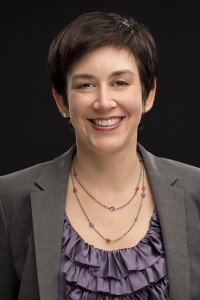
Dr. Anne Pomerantz, University of Pennsylvania
Title: Teaching Humor in the Language Classroom: Seriously?!
Abstract: Language educators often regard humor as either too difficult to teach or ancillary to their curricular goals. Additional language learners, however, often report a desire to initiate and/or participate more actively in humorous exchanges, particularly outside the language classroom. In this presentation, I make a case for focusing on humor in instructional settings, noting how it can be used as a vehicle to promote metalinguistic awareness and a way to increase students’ interactional confidence and competence. Likewise, I offer principles for designing lessons about humor, as well as sample instructional plans. This presentation is intended to pique language teachers’ interest in humor and provide them with a sound theoretical basis for developing their own instructional activities.
Bio: Anne Pomerantz is a Senior Lecturer in the Educational Linguistics program at the University of Pennsylvania, Graduate School of Education, where she teaches classes on language & identity, second language pedagogy, and intercultural communication. Her work has appeared in Applied Linguistics, Critical Inquiry in Language Studies, Journal of Language & Identity in Education, Journal of Language & Intercultural Communication, Modern Language Journal, and Multilingua.
Wednesday, October 2, 2013, 3:30pm, Kiva Auditorium
Dr. K. David Harrison, Swarthmore College

Title: Endangered Languages
Abstract: Approximately half of the world’s 7,000 languages are predicted to go extinct in this century. In this talk I discuss how language death leads to intellectual impoverishment in all fields of science and culture. I also detail efforts by “language warriors” to sustain, value and revitalize linguistic diversity worldwide. Local perspectives on language endangerment and extinction are illustrated with original field materials and recordings of last speakers from Siberia, India, Chile, and the United States. Global trends in language diversity are explored through the use of a new quantitative model “Language Hotspots”.
Bio: K. David Harrison is a linguist and leading specialist in the study of endangered languages. He co-leads the Enduring Voices project at National Geographic and is an associate professor at Swarthmore College. He received his doctorate from Yale University. Harrison has done extensive fieldwork in Siberia, Mongolia, Bolivia, India, and Native America. In his book, When Languages Die: The Extinction of the World’s Languages and the Erosion of Human Knowledge (Oxford 2007), Harrison provides a vivid picture of the scientific consequences of language loss. He also depicts the human factor, including moving accounts of his encounters with last speakers in remote corners of the globe. Harrison’s work includes not only scientific descriptions of languages, but also storybooks, translations and digital archives for the use of the native speaker communities. Harrison co-stars in the documentary film The Linguists, which premiered at Sundance Film Festival to rave reviews in February 2008, and appeared at film festivals across the country (Boston, Madison, Dallas). Professor Noam Chomsky characterized the film as a “breathtaking thrill ride through the landscape of language.” The Hollywood Reporter writes: “Indiana Jones’ spirit certainly infects the intrepid heroes of ‘The Linguists.’ These are bold academics who plunge into the jungles and backwater villages of the world to rescue living tongues about to go extinct.”
Thursday, September 19, 2013, 3:30pm, Kiva Auditorium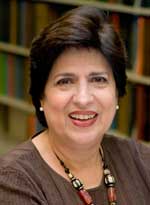
Dr. Ofelia García, City University of New York
Title: Transformative Power of Translanguaging in Schools
Abstract: This presentation will contribute to our understandings of the transformative power of translanguaging in classrooms with linguistically diverse students. I start by reviewing the meanings of translanguaging and its potential to produce alternative representations, while engaging the voices, identities and cognitive functioning of linguistically diverse students. I draw examples from NYC school cases to contextualize how teachers with different characteristics and in different educational programs draw on translanguaging as a resource. I also share our CUNY-NYSIEB work, as university scholars, school leaders and teachers collaborate to improve the education of those we call “emergent bilinguals.”
Bio: Ofelia García is Professor in the Ph.D. programs of Urban Education and of Hispanic and Luso-Brazilian Literatures and Languages at the Graduate Center of the City University of New York. She has been Professor of Bilingual Education at Columbia University´s Teachers College, Dean of the School of Education at the Brooklyn Campus of Long Island University, and Professor of Education at The City College of New York. Among her recent books are Bilingual Education in the 21st Century: A Global Perspective; Educating Emergent Bilinguals (with J. Kleifgen), Handbook of Language and Ethnic Identity (with J. Fishman), Negotiating Language Policies in Schools: Educators as Policymakers (with K. Menken), Imagining Multilingual Schools (with T. Skutnabb-Kangas and M. Torres-Guzmán), and A Reader in Bilingual Education (with C. Baker). She is the Associate General Editor of the International Journal of the Sociology of Language. García was the recipient of the 2008 NYSABE Gladys Correa Award, is a Fellow of the Stellenbosch Institute for Advanced Study in South Africa, and has been a Fulbright Scholar, and a Spencer Fellow of the U.S. National Academy of Education.
Listen to Dr. García’s talk here!
Monday, September 16, 2013, 3:30pm, Kiva Auditorium

Dr. John A. Lucy, University of Chicago
Title: Language Diversity, Cultural Practice, and the Development of Mind
Abstract: Language holds a special place in human life. It is distinctive of our species. It also provides the dominant medium for social interaction, helping to enable cultural traditions. Likewise, it provides an important medium of psychological representation, helping to constitute the individual human mind. Thus language, culture, and mind are intricately bound together at the core of what it is to be human. Though few doubt the importance of language, we still debate just exactly how large a shaping role plays in this mix and in precisely what ways. Since there is no one universal language but rather myriad individual languages all differing from one another in important respects, one perennial debate concerns just how important these differences between languages are in the mediation of culture and mind. The contention that the particular language we speak influences the way we experience and think about the world has been called the linguistic relativity proposal. This talk will present an overview of recent thinking and research on this topic. The first part characterizes the relativity proposal both conceptually and historically, showing how current approaches fit into our own intellectual tradition. The second part presents some key contemporary findings, showing how research gets done and the range of language-specific effects on thinking that have been identified. The third part describes recent psychological research with deaf people, children, and bilinguals, seeking to uncover the mechanisms underlying language effects. The final closing section suggests how language form, cultural practice, and individual cognition enter into a dialogue during child development to create a characteristically human orientation to the world.